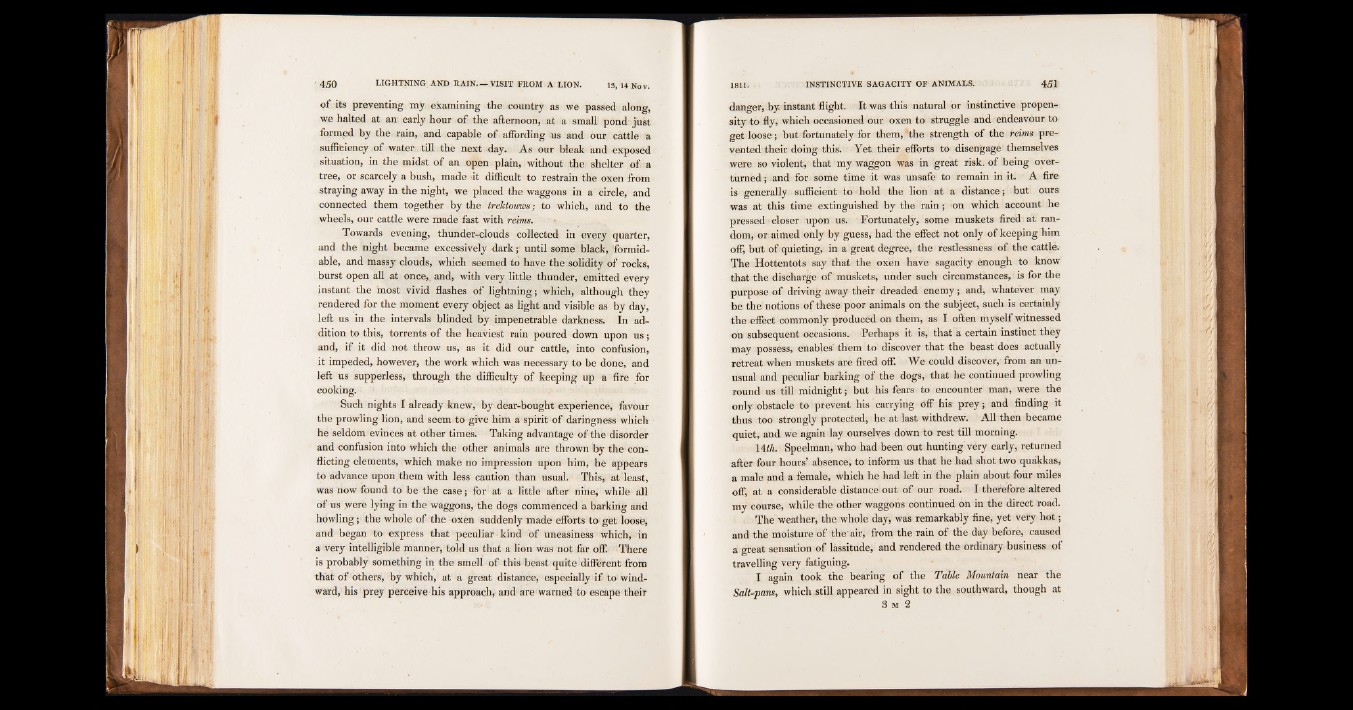
of its preventing my examining the country as we passed along,
we halted at an early hour of the afternoon, at a small pond just
formed by the rain, and capable of affording us and our cattle a
sufficiency ¡of water till the next day. As our bleak' and exposed
situation, in the midst of an open plain, without the shelter of a
tree, or scarcely a bush, made it difficult to restrain the oxen from
straying away in the night, we placed the waggons in a circle, and
connected them together by the trektowws; to which, and to the
wheels, our cattle were made fast with rams.
Towards evening, thunder-douds collected in every quarter,
and the night became excessively dark; until some black, formidable,
and massy clouds, which seemed to have the solidity of rocks,
burst open all at once,, and, with very little thunder, emitted every
instant the most vivid flashes of lightning; which, although they
rendered for the moment every object as light and visible as by day,
left us in the intervals blinded by impenetrable darkness. In addition
to this, torrents of the heaviest rain poured down upon u s ;
and, if it did not throw us, as it did our cattle, into confusion,
it impeded, however, the work which was necessary to be done, and
left us supperless, through the difficulty of keeping up a fire for
cooking.
Such nights I already knew, by dear-bought experience, favour
the prowling lion, and seem to give him a spirit of daringness which
he seldom evinces at other times. Taking advantage of the disorder
and confusion into which the other animals are thrown by the conflicting
elements, which make no impression upon him, he appears
to advance upon them with less caution than usual. This, at least,
was now found to be the case; for at a little after nine, while all
of us were lying in the waggons, the dogs commenced a barking and
howling; the whole of the oxen suddenly made efforts to get loose,
and began to express that peculiar kind of uneasiness which, in
a very intelligible manner, told us that a lion was not far off. There
is probably something in the smell of this beast quite different from
that of others, by which, at a great distance, especially if to windward,
his prey perceive his approach, and are warned to escape their
danger, by instant flight. It was this natural or instinctive propensity
to fly, which occasioned our oxen to struggle and endeavour to
get loose; but fortunately for them, "the strength of the reims prevented
their doing this. Yet. their efforts to disengage themselves
were so violent, that my waggon was in great risk, of being overturned
; and for some time it was unsafe to remain in it. A fire
is generally sufficient to hold the lioh at a distance; but ours
was at this time extinguished by the rain; on which account he
pressed closer upon us. Fortunately, some muskets fired at random,
or aimed only by guess, had the effect not only of keeping him
off, but of quieting, in a great degree, the restlessness of the cattle.
The Hottentots say that the oxen have sagacity enough to know
that the discharge of muskets, under such circumstances, is for the
purpose of driving away their dreaded enemy; and, whatever may
be the notions of these poor animals on the subject, such is certainly
the effect commonly produced on them, as I often myself witnessed
on subsequent occasions. Perhaps it is, that a certain instinct they
may possess, enables’ them to discover that the beast does actually
retreat when muskets are fired off. We could discover, from an unusual
and peculiar barking of the dogs, that he continued prowling
round us till midnight; but his fears to encounter man, were the
only obstacle to prevent his carrying off his prey; and finding it
thus too strongly protected, he at last withdrew. All then became
quiet, and we again lay .ourselves down to rest till morning.
14th. Speelman, who had been out hunting very early, returned
after four hours’ absence, to inform us that he had shot two quakkas,
a male and a female, which he had left in the plain about four miles
off, at a considerable distance out of our road. I therefore altered
my course, while the other waggons continued on in the direct road.
The weather, the whole day, was remarkably fine, yet very h o t;
and the moisture of the air, from the rain of the day before, caused
a great sensation of lassitude, and rendered the ordinary business of
travelling very fatiguing.
I again took the bearing of the Table Mountain near the
Salt-pans, which still appeared in sight to the southward, though at
3 M 2